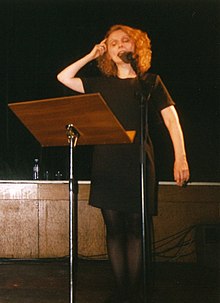Dagmar Krause
| Dagmar Krause | |
|---|---|

Dagmar Krause at the LMC in London in 1997.
|
|
| Background information | |
| Born |
4 June 1950 Hamburg, Germany |
| Genres | Avant-rock, experimental, cabaret, classical |
| Occupation(s) | Musician |
| Instruments | Vocals, piano |
| Years active | 1968–present |
| Labels | Hannibal, Island, Voiceprint |
| Associated acts |
Slapp Happy, Henry Cow, Art Bears, News from Babel, Kevin Coyne |
Dagmar Krause (born 4 June 1950) is a German singer, best known for her work with avant-rock groups including Slapp Happy, Henry Cow, and Art Bears. She is also noted for her coverage of songs by Bertolt Brecht, Kurt Weill and Hanns Eisler. Her unusual singing style makes her voice instantly recognisable and has defined the sound of many of the bands with whom she has worked.
Dagmar Krause was born in Hamburg, Germany on 4 June 1950. She began her professional career at the age of 14 as a singer in Hamburg clubs on the Reeperbahn. In 1968 she was invited to join the City Preachers, a contemporary folk/protest she once half-jokingly described as a German version of The Mamas & the Papas. She contributed vocals to their 1968 album Der Kürbis, das Transportproblem und die Traumtänzer (The Pumpkin, the Problem of Transport and the Dream-dancers), a spin-off from a German TV show. The City Preachers broke up in 1969, but their lead singer Inga Rumpf and Krause reunited in 1970 to record I.D. Company, the name of a studio project where each vocalist sung lead on and determined the direction of one side of the LP (Krause's side indicated her future direction with its avant-garde slant).
Hamburg had a thriving avant-garde scene that attracted numerous European musicians interested in pursuing aesthetic freedom and experimental music. It was here that Krause met, and later married, British experimental composer Anthony Moore. In 1972, Moore, Krause and Moore's visiting American friend, singer-songwriter Peter Blegvad formed Slapp Happy, a self-described "naive rock" group which mixed simple pop structures with obfuscatory lyrics drawing equally from semiotic and symbolist traditions. Slapp Happy was the beginning of Krause's international musical career. They recorded two albums in Germany for Polydor with Faust as their backing band, Sort Of (1972) and what subsequently became known as Acnalbasac Noom (not released at the time). Then they moved to London where they recorded a new arrangement of Acnalbasac Noom for Virgin Records, released as Slapp Happy, also known as Casablanca Moon (1974). The original Acnalbasac Noom only saw the light of day in 1980 when it was released by Recommended Records.
...
Wikipedia
